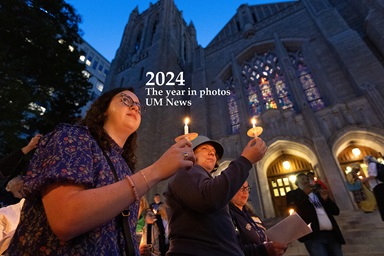Key points:
- A new report shows that The United Methodist Church is still at the beginning stages of cutting greenhouse-gas emissions.
- The goal is to be net-zero by 2050, meaning that agencies, boards and commissions are effectively ceasing to damage the environment through energy use.
- The balance between cutting emissions and keeping up vital ministries is a delicate one.
It’s been a year since most of the agencies of The United Methodist Church committed to reducing greenhouse-gas emissions to a point in 2050 where they are adding nothing — net zero — to cause global warming.
The most important lesson learned so far? It’s an extremely complicated endeavor.
“An important focus of this work is equity and justice,” said the Rev. Jenny Phillips, senior technical adviser for environmental sustainability at United Methodist Global Ministries, who is a co-convener of the agencies' net-zero effort.
“We want to be sure that the interventions we take are ones that don’t off-load more suffering on communities that are already experiencing hardship due to pollution and climate,” she said. “We could all just run out and buy whatever offsets are on the market, but if they’re offsets that have negative impacts on certain communities, that’s not the right solution.”

Offsets involve activities such as the funding of planting trees and renewable energy sources to make up for the release of greenhouse gases. An organization can purchase such offsets in the marketplace.
“We’re counting emissions, but how are we also going to track and count our equity injustice impact?” Phillips said. “That’s a puzzle that we don't have an answer to yet.”
The net-zero commitment was announced on Earth Day in 2021 and a report of the first year’s effort was released by the United Methodist Interagency Just and Equitable Net-Zero Coalition on April 19, three days ahead of this year’s Earth Day celebration.
Initiatives the first year included training on how to use the EnergyStar Portfolio, a tool that tracks energy use and emissions from buildings, and some exploratory discussions on how to keep equity and justice concerns in mind while making changes to cut emissions.
“Net-zero is an important goal that will require collaboration and innovation within the broader church and beyond,” said Jake Barnett, director of sustainable investment stewardship for the church's Wespath Benefits and Investments, in a press release.
Along with Phillips, Barnett is a co-convener for the agencies' net-zero work. “Our agencies look forward to continuing to partner and learn from each other’s differentiated expertise as we work to bring about the systemic change that will support a just and equitable net-zero future,” he said.
All United Methodist boards, commissions and agencies have made the net-zero commitment, with the exception of the United Methodist Publishing House, whose bottom line was severely reduced by the coronavirus pandemic.
More about
net-zero effort
United Methodist agencies have committed to the emission-reduction effort in hopes of ensuring that the ministries of the present support the flourishing of God’s creation for the future.
Read press release.
Read progress report.
“The number and nature of in-person activities for all ages have been significantly disrupted for most churches and as a result, they’ve required fewer worship, educational and program resources,” said the Rev. Brian Milford, president and publisher of the publishing house.
Revenue dropped 43% during the pandemic, Milford said. The Publishing House also receives no allocations from the denomination. Last year, it reduced its staff from 300 to about 130 and sold its building, relocating to much smaller offices and transitioning most employees to remote work. Those changes have almost certainly lowered the agency’s greenhouse emissions.
But although the Publishing House hasn’t been able to commit to net-zero emissions by 2050, it is actively working on it.
“They have been participating in the trainings and in the conversations,” Phillips said. “They are very engaged.”
Other agencies, such as the United Methodist Commission on Archives and History, also have unique challenges. Paper files and artifacts need specific climate controls to stay preserved.
“We do rely on energy to maintain exact humidity and temperature controls in order to preserve our repository, but also we do not actually own our building,” said Ashley Boggan Dreff, chief executive. The commission is located on the campus of Drew University in Madison, New Jersey.
“This year, Drew is installing a new (heating, ventilation and air conditioning) and humidity control system, which should be more energy efficient,” Dreff said. “We’re continually working with our board and Drew to come up with creative ways to offset our carbon footprint while ensuring that our disciplinary mandate of preservation is met.”

Abruptly cutting off the use of fossil fuels at Global Ministries-supported medical facilities, which are all over the world, would be catastrophic.
“I don’t, for example, want to say, ‘Well, we’re no longer going to provide fuel for our health care facilities,’” Phillips said. “We want to cut emissions, but that’s not an OK solution for reducing emissions.”
Instead, she said, the Global Ministries brain trust is thinking long-term by assessing energy needs and current energy sources of some of the hospitals and clinics in Africa and elsewhere.
“We’re … then developing a longer-term strategy for how we're going to address those energy needs sustainably,” she added.
Staff from United Methodist Global Ministries, Church and Society, Higher Education and Ministry, Communications, United Women in Faith and Wespath Benefits and Investments form the core team working on the net-zero project. There is an open invitation to other agency representatives who wish to participate.
Subscribe to our
e-newsletter
Business travel, which was curtailed significantly during the pandemic, is a concern as annual events return to their normal schedules.
“We’re in deep discussion about … how do we balance the missional needs for human contact and human relationship with the missional needs related to ensuring the flourishing of a healthy Earth for the church of the future,” Phillips said.
While the climate crisis needs to be handled as an urgent manner, other needs have to be part of the equation, she said.
“We need to move quickly (to reach net-zero status by 2050), but we also are dealing with people in crisis right now and working to alleviate suffering right now.
“We’ve got to really walk that path very carefully. … So I want you to know, we’re earnest in that.”
Patterson is a UM News reporter in Nashville, Tennessee. Contact him at 615-742-5470 or [email protected]. To read more United Methodist news, subscribe to the free Daily or Weekly Digests.




